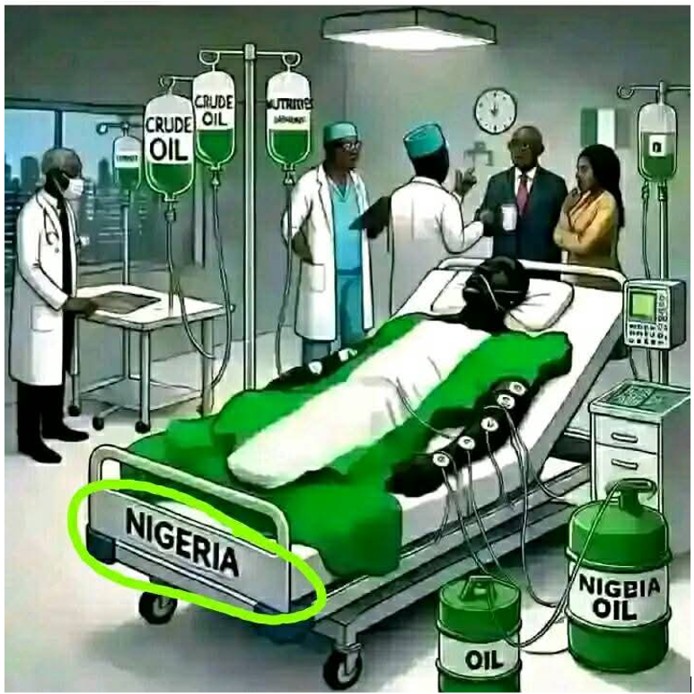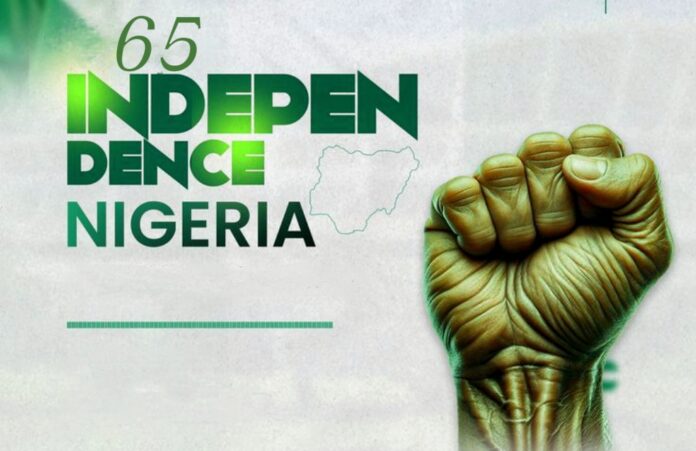By Lawan Musa (Baba Lawan )
As Nigeria marks 65 years of formal independence, the question nobody asks—yet everyone feels—is: Who is this day for? For the political class, the oligarchs, the elites, Independence Day is a spectacle of pageantry, a stage for speeches and pomp. For the millions of ordinary Nigerians — the farmers, traders, artisans, domestic workers, the jobless youth, the rural poor — it is a day that echoes with absence: absence of infrastructure, absence of dignity, absence of hope.
A Nation at Lights Out

One of the most glaring betrayals of the social contract is the perennial failure of electricity supply. In 2025, entire towns still rely on private generators; hospitals, dormitories, factories, and homes go into darkness within hours of sunset. A nation so richly endowed, yet still shackled by load‐shedding, blackouts, and grid collapse.
A Storm of Inflation and Price Hikes
While families struggle, the cost of living has spiraled out of control. In October 2024, headline inflation in Nigeria hit 33.88 percent year-on-year.
In June 2024, it had already surged to 34.19 percent.
By early 2025, inflation moderated somewhat—dropping to about 24.23 percent in March 2025 —but that relief is cold comfort when food, fuel, transport and utilities have all doubled or tripled in cost.
These numbers are not abstractions. They mean mothers unable to afford two meals; young men walking instead of boarding minibuses; hospitals running out of supplies; traders shutting shops because input costs exceed returns.
Poverty Swallows the Majority
Independent Nigeria was supposed to lift millions out of penury. Instead, poverty has become structural and universal. According to the World Bank, 56 percent of Nigerians now live below the national poverty line—equivalent to about 129 million people.
This is a staggering shift from the 40.1 percent poverty rate recorded in 2018/19.
Multidimensional poverty is even more brutal: 63 percent of Nigerians are classified as multi‐dimensionally poor (lacking in health, education, living standards) , and in rural areas, as many as 72 percent may be trapped in multiple deprivations.
Children suffer worst: more than two-thirds of children (0–17) are multidimensionally poor, and over half of all poor people are children.
In short: poverty is no longer the exception; it is the condition.
Jobs in Name Only, Insecurity in Reality
What of employment? Official unemployment data is suspect. The Nigerian statistics agency, in a controversial revision, now reports the national unemployment rate at 4.3 percent, with underemployment at 9.2 percent under its new methodology.
Critics say this undercounts the reality: people working one hour a week count as employed, masking chronic underemployment and economic despair.
Other sources paint a bleaker picture. In Q3 2024, Nigeria’s jobless rate reportedly climbed to 5 percent after removal of fuel subsidies. Youth unemployment during that period reached 8.6 percent. More alarmingly, informal and precarious work dominate: 87 percent of workers are self‐employed, while only 12.7 percent enjoy wage employment.
On the security front, the country is fragmented by violence. Kidnappings, banditry, farmer–herder clashes, insurgency, and communal strife are daily headlines. Rural areas are cut off; farmers abandon fields. Insecurity functions like a tax on poor people’s lives, making access to farms, markets, schools, and clinics hazardous or impossible.
Independence as Illusion for the Many
Independence Day is ritually observed with parades, speeches, flags, and bombastic declarations of “progress” and “renewal.” But for millions, the only markers of change are in the price they pay, the darkness they endure, the bullets they fear, the hunger they swallow.
The elite—politicians, contractors, connected businessmen—rejoice. They dine in gala halls, enjoy security and stable power, travel in convoys, and recite speeches to cameras. They own the narrative of “Nigeria Rising.” But the people — the poor, the marginalized, the silent majority — are left to wonder: rising to what? To more debt, more deprivation, more despair?
What Independence Should Mean, But Doesn’t
True independence should mean:
1. Freedom from Poverty: So that no citizen is forced to live on less than a decent minimum threshold.
2. Freedom from Fear: So that road travel, farming, schools, and markets are safe, not battlegrounds.
3. Freedom from Darkness: So that electricity is reliable, industry can flourish, homes can function, education and health can operate.
4. Freedom of Opportunity: Real jobs, real wages, real skills, real mobility—not just “informal hustle” or survival.
Until those freedoms are widely realized, Nigeria’s 65th Independence will remain a spectacle for elites—a gilded mask over a suffering majority.
A Call for Accountability and Rebirth
On this day, the brinkmanship of rhetoric must give way to accountability. Leaders must be judged by service, not speeches. The people must demand:
- A living wage that keeps pace with inflation.
- A credible plan to reduce multidimensional poverty.
- Increased spending on public health and education – decent services free for all.
- A security paradigm centred on civilians, not force.
- Transparent budgeting and spending data.
If the 65 years since 1960 have taught us anything, it is that independence without dignity is a hollow shell. Until Nigeria is independent for its people—not just in name—there is little cause to celebrate.






